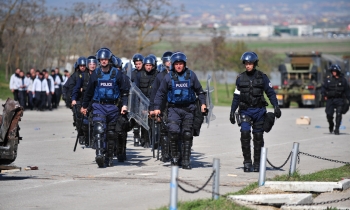The Pentagon is brushing off a request for more information and a decision on an Associated Press photographer held for six months in Iraq without formal charges.
In a letter to the Committee to Protect Journalists, Bryan Whitman, a Pentagon spokesman, does not provide details about why Iraqi photographer Bilal Hussein remains at a U.S. run prison camp. The letter repeats the military’s long-standing assertion that it detained Hussein under authority of U-N resolutions and in accord with the Geneva Conventions.
Hussein was arrested April 12th. The military says he was in the company of two alleged insurgents, in an apartment where there were bomb-making materials. They also say he had “strong ties” to insurgents that go beyond the role of a journalist.
After months of behind-the-scenes negotiations, The Associated Press last month made a public call for the military to either charge Hussein with a crime or release him. AP executives said the news cooperative’s review of Hussein’s work did not find inappropriate contact with insurgents and that U.N. resolutions do not allow for indefinite detention. The AP said any evidence against Hussein should be brought to the Iraqi criminal justice system or else he should be released.
After the AP request, Paul Steiger, chairman of the Committee to Protect Journalists, sought information about Hussein’s detention, and asked for the Pentagon to say whether it would charge him with a crime. He noted that in several cases where journalists have been detained by U.S. forces for lengthy periods, they ultimately were released without charges or convictions.
“If U.S. military officials do not intend to charge Hussein with a crime, we believe he should be released at once,” Steiger wrote.
Whitman, in his response, said Hussein has been notified and given an opportunity to provide information for consideration in at least two of three military reviews of his detention.
But an AP executive said that was true only for one of the three hearings – and the notice came after the hearing took place.
“Bilal Hussein was not aware that any of these took place,” said Dave Tomlin, AP’s associate general counsel. “So he obviously wasn’t present for any of them, nor was he represented at any of them.”
“We regard all these so-called due process events as legally meaningless, and in fact consider it laughable that the term ‘due process’ would even be applied to them,” Tomlin said.
AP executives went public with news about Hussein’s detention Sept. 10 after months of behind-the-scenes negotiations. They said the news cooperative’s review of Hussein’s work did not find inappropriate contact with insurgents and that U.N. resolutions do not allow for indefinite detention. Any evidence against him, they said, should be brought to the Iraqi criminal justice system or else he should be released.
Hussein is one of an estimated 14,000 people detained as suspected security threats by the U.S. military worldwide; some 13,000 of them are in Iraq. Few are charged with a specific crime or given a chance before any court or tribunal to argue for their freedom.









